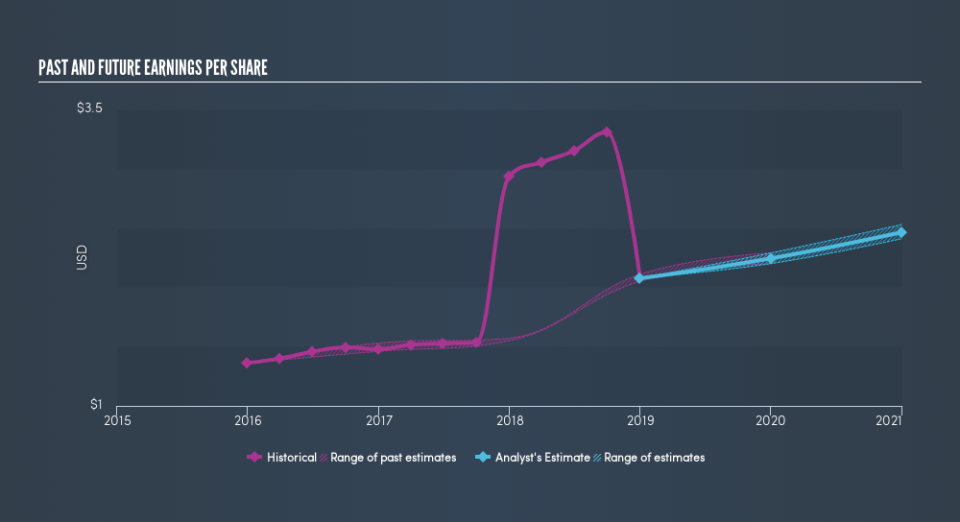Update: ManTech International (NASDAQ:MANT) Stock Gained 79% In The Last Five Years

Want to participate in a research study? Help shape the future of investing tools and earn a $60 gift card!
When we invest, we’re generally looking for stocks that outperform the market average. Buying under-rated businesses is one path to excess returns. For example, long term ManTech International Corporation (NASDAQ:MANT) shareholders have enjoyed a 79% share price rise over the last half decade, well in excess of the market return of around 42% (not including dividends).
Check out our latest analysis for ManTech International
To quote Buffett, ‘Ships will sail around the world but the Flat Earth Society will flourish. There will continue to be wide discrepancies between price and value in the marketplace…’ One flawed but reasonable way to assess how sentiment around a company has changed is to compare the earnings per share (EPS) with the share price.
During the last half decade, ManTech International became profitable. That’s generally thought to be a genuine positive, so we would expect to see an increasing share price. Since the company was unprofitable five years ago, but not three years ago, it’s worth taking a look at the returns in the last three years, too. We can see that the ManTech International share price is up 67% in the last three years. During the same period, EPS grew by 15% each year. This EPS growth is reasonably close to the 19% average annual increase in the share price (over three years, again). That suggests that the market sentiment around the company hasn’t changed much over that time. Arguably the share price is reflecting the earnings per share.
You can see how EPS has changed over time in the image below (click on the chart to see the exact values).
This free interactive report on ManTech International’s earnings, revenue and cash flow is a great place to start, if you want to investigate the stock further.
What About Dividends?
When looking at investment returns, it is important to consider the difference between total shareholder return (TSR) and share price return. The TSR incorporates the value of any spin-offs or discounted capital raisings, along with any dividends, based on the assumption that the dividends are reinvested. So for companies that pay a generous dividend, the TSR is often a lot higher than the share price return. In the case of ManTech International, it has a TSR of 100% for the last 5 years. That exceeds its share price return that we previously mentioned. This is largely a result of its dividend payments!
A Different Perspective
While the broader market gained around 7.9% in the last year, ManTech International shareholders lost 1.3% (even including dividends). Even the share prices of good stocks drop sometimes, but we want to see improvements in the fundamental metrics of a business, before getting too interested. On the bright side, long term shareholders have made money, with a gain of 15% per year over half a decade. It could be that the recent sell-off is an opportunity, so it may be worth checking the fundamental data for signs of a long term growth trend. Most investors take the time to check the data on insider transactions. You can click here to see if insiders have been buying or selling.
If you would prefer to check out another company — one with potentially superior financials — then do not miss this free list of companies that have proven they can grow earnings.
Please note, the market returns quoted in this article reflect the market weighted average returns of stocks that currently trade on US exchanges.
We aim to bring you long-term focused research analysis driven by fundamental data. Note that our analysis may not factor in the latest price-sensitive company announcements or qualitative material.
If you spot an error that warrants correction, please contact the editor at editorial-team@simplywallst.com. This article by Simply Wall St is general in nature. It does not constitute a recommendation to buy or sell any stock, and does not take account of your objectives, or your financial situation. Simply Wall St has no position in the stocks mentioned. Thank you for reading.

